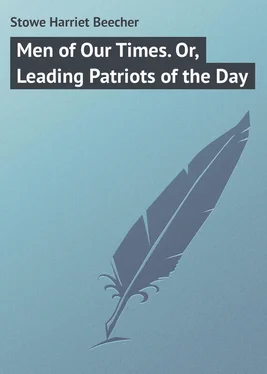Harriet Stowe - Men of Our Times. Or, Leading Patriots of the Day
Здесь есть возможность читать онлайн «Harriet Stowe - Men of Our Times. Or, Leading Patriots of the Day» — ознакомительный отрывок электронной книги совершенно бесплатно, а после прочтения отрывка купить полную версию. В некоторых случаях можно слушать аудио, скачать через торрент в формате fb2 и присутствует краткое содержание. ISBN: , Жанр: foreign_language, foreign_prose, на английском языке. Описание произведения, (предисловие) а так же отзывы посетителей доступны на портале библиотеки ЛибКат.
- Название:Men of Our Times. Or, Leading Patriots of the Day
- Автор:
- Жанр:
- Год:неизвестен
- ISBN:http://www.gutenberg.org/ebooks/46347
- Рейтинг книги:5 / 5. Голосов: 1
-
Избранное:Добавить в избранное
- Отзывы:
-
Ваша оценка:
- 100
- 1
- 2
- 3
- 4
- 5
Men of Our Times. Or, Leading Patriots of the Day: краткое содержание, описание и аннотация
Предлагаем к чтению аннотацию, описание, краткое содержание или предисловие (зависит от того, что написал сам автор книги «Men of Our Times. Or, Leading Patriots of the Day»). Если вы не нашли необходимую информацию о книге — напишите в комментариях, мы постараемся отыскать её.
Men of Our Times. Or, Leading Patriots of the Day — читать онлайн ознакомительный отрывок
Ниже представлен текст книги, разбитый по страницам. Система сохранения места последней прочитанной страницы, позволяет с удобством читать онлайн бесплатно книгу «Men of Our Times. Or, Leading Patriots of the Day», без необходимости каждый раз заново искать на чём Вы остановились. Поставьте закладку, и сможете в любой момент перейти на страницу, на которой закончили чтение.
Интервал:
Закладка:
During other previous and subsequent portions of his life, other traits of Mr. Lincoln's character were often and clearly exemplified. But at no time was he nearly as plainly and strikingly prominent as a power, as during his contest with that bold and energetic politician and remarkably ready and forcible debater, Stephen A. Douglas.
Their first great public duel, as it may be called, was at Springfield, in October, 1854, just after the passage of the Nebraska bill. The country was all aflame with excitement. Every fibre of justice, honor, honesty, conscience that there was in the community was in that smarting and vibrating state which follows the infliction of a violent blow, and Douglas had come back to his own state to soothe down the irritation and to defend his wicked and unpopular course before the aroused tribunal of his fellow citizens.
He was to defend his course and conduct to a great audience assembled at the State fair, and Mr. Lincoln was to answer him.
Never was there a greater contrast between two men. Douglas might be called a brilliant impersonation of all the mere worldly forces of human nature. He had a splendid physique, with all the powers of the most captivating oratory, the melody of a most astonishing voice which ran with ease through every gamut of human feeling, grave, gay, pathetic, passionate, enthusiastic; now rising with irresistible impetuosity, now mocking with gay and careless defiance, and with this voice and this person, he was master of all those shadings and delicacies of sophistry by which the worse can be made to appear the better reason. He knew well how to avoid answering a telling argument by a dazzling glitter of side issues – to make a plain man believe he had got his difficulty solved, when he had been only skilfully bewitched, and made to forget where it was. In a popular audience he had something for every one. Gaiety, gallantry and compliments for ladies, assured confidence for doubters, vehement assertions for timid people, stormy brow-beatings, and lion roars of denunciation, to finish with a grand sweep the popular impression which his sophistries and assertions had begun. Of truth, he made that very sparing use which demagogues always do. A little blue line of steel makes a whole heavy headed iron axe go through the wood, – and so Douglas just skilfully and artistically tipped the edges of heavy masses of falsehood with the cutting force of some undeniable truth.
Of moral sensibility Douglas had not enough in his nature, even to understand that kind of material in others, and to make allowance for it. Nothing could be more exactly the contrary of Lincoln's scrupulous careful self-education, in pure questions of the right and the wrong of things, than Douglas' glittering, careless, reckless, defiant mode of treating all these subjects. Lincoln had trained himself always to ask, What is it right to do? Douglas, What can I do? Lincoln, to enquire What course ought they to take? Douglas, What course can I make them take? Lincoln, to ask, What is the truth – Douglas, What can be made to seem truth. His life question was an inquiry, pure and simple, how much can I get, how much can I do, without losing my hold over men and being turned out of society?
The pure moral aspects of political questions, he flouted and scoffed at as unworthy the attention of a practical politician. The rights of human beings, the eternal laws of rectitude, he treated as a skilful conjurer treats so many gaily painted balls, which he throws up and tosses and catches, simply to show his own agility; he played with them when they came in his way, just as he thought he could make them most effective for his own purposes.
But if he did not understand or care for eternal principles, he was perfect master of all the weak and low and petty side of human nature. He knew how to stir up all the common-place, base and ignoble passions of man; to bring his lower nature into lively exercise.
The first day in the fair, the multitude was given up to him, and he swept and played on them as a master musician sweeps a piano, and for the hour he seemed to be irresistible, bearing all things in his own way.
Lincoln had this advantage, when his turn came, that he represented that higher portion of human nature, of which Douglas had little knowledge, and which his mode of treatment had left almost wholly untouched. We have spoken of the vast legal influence which Lincoln had gradually acquired in his own state, by the intense pertinacity with which he identified himself in every case with right and justice, so that the mere fact that he had accepted a cause was a strong reason in advance for believing it the true one.
The people had been excited, amused, dazzled and bewildered, and were tossing restlessly as the sea swells and dashes after a gale – when that plain man without outward "form or comeliness," without dazzle of oratory, or glitter of rhetoric, rose to give them in a fatherly talk, the simple eternal RIGHT of the whole thing.
It was, he felt, an hour of destiny, a crisis in the great battle to be fought for mankind for ages to come, and an eye witness thus describes the scene: "His whole heart was in the subject. He quivered with feeling and emotion; the house was as still as death." And another account describes how "the effect of this speech was most magnetic and powerful. Cheer upon cheer interrupted him, women waved their handkerchiefs, men sprung from their seats and waved their hats in uncontrollable enthusiasm." Mr. Douglas was present at this speech, and was the most uneasy auditor there. As soon as Mr. Lincoln had concluded, Mr. Douglas jumped up and said that he had been abused, "though," he added, "in a perfectly courteous manner." He went on with a rejoinder, and spoke for some time, but without much success. In fact, he was astounded and disconcerted at finding that there was so much to be said against him, and that there was a man to say it so powerfully. The self-confident and even arrogant tone in which he had opened the debate was gone. At closing, he announced himself to continue his remarks in the evening, but he did not do it. He had received a blow too tremendous even for his immense vigor, and from which he could not so quickly recover.
A little while afterwards, Douglas spoke again and Lincoln answered him again, at Peoria, and with a similar result. The vast positive will of the "Little Giant" could not stand up against the still loftier power with which Mr. Lincoln assailed him from the height of a moral superiority that irresistibly carried with it the best convictions of the whole community, and cowed the defiant wrong-doer. Mr. Lincoln was right . Mr. Douglas felt himself vanquished by a power incomprehensible to himself, and of which none of his political calculations ever took account.
But as regards the struggle at this time in Illinois, the fact that he felt himself over-weighted, was sufficiently proved by his declining, after the two duels at Springfield and Peoria, to proceed, as Mr. Lincoln invited him, with a series of such debates in other parts of the State.
Mr. Lincoln, having thus publicly shown himself far stronger than the strongest of his opponents, proceeded to show himself a man of kindly self-command, by foregoing the Republican nomination to the U. S. Senate, and giving it to Hon. Lyman Trumbull, in order to save the risk of admitting Matteson, the pro-slavery candidate. Unquestionably this conduct coincided with the shrewdest selfishness; but very few are the politicians from whom a selfishness small and near would not conceal the larger and further one. It was by earnest and assiduous personal influence that Mr. Lincoln secured Mr. Trumbull's election.
It is said of a certain great diplomatist, that he was so accustomed to dealing with men as knaves that when he had to do with an honest man he always blundered. Douglas' mistake and defeat were precisely of this kind. He had so little sense of conscience or moral feeling himself that he was perfectly unprepared for the uprising of these sentiments on the part of the people, and astonished at the power which a man might wield simply from addressing a class of sentiments which he habitually ignored.
Читать дальшеИнтервал:
Закладка:
Похожие книги на «Men of Our Times. Or, Leading Patriots of the Day»
Представляем Вашему вниманию похожие книги на «Men of Our Times. Or, Leading Patriots of the Day» списком для выбора. Мы отобрали схожую по названию и смыслу литературу в надежде предоставить читателям больше вариантов отыскать новые, интересные, ещё непрочитанные произведения.
Обсуждение, отзывы о книге «Men of Our Times. Or, Leading Patriots of the Day» и просто собственные мнения читателей. Оставьте ваши комментарии, напишите, что Вы думаете о произведении, его смысле или главных героях. Укажите что конкретно понравилось, а что нет, и почему Вы так считаете.












